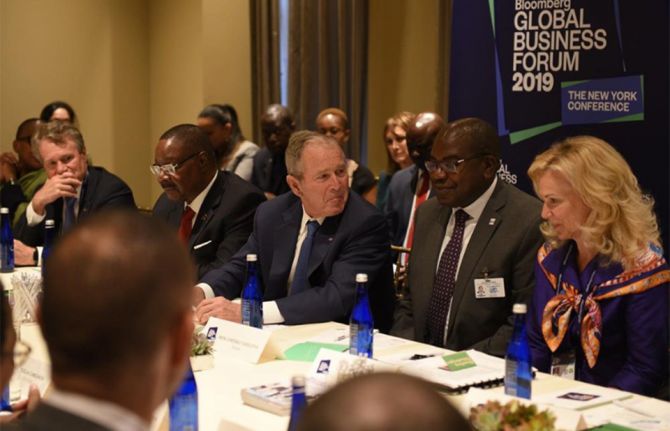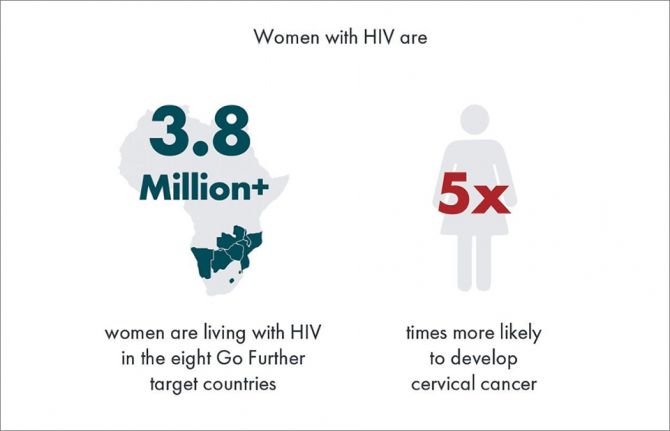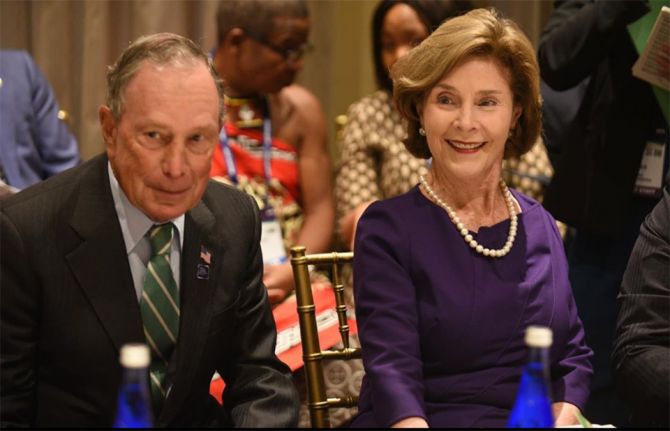



Press Release
Go Further partnership reaches over half a million HIV-positive women with cervical cancer screening in its first year
25 September 2019 25 September 2019The United States’ PEPFAR program, the George W. Bush Institute, Merck and UNAIDS are aiming to end AIDS and cervical cancer in Sub-Saharan Africa within a generation through an innovative public-private partnership
NEW YORK, 25 September 2019—On the margins of the 2019 United Nations General Assembly, former President George W. Bush and Ambassador Deborah L. Birx announced that the Go Further partnership to end AIDS and cervical cancer has reached over half a million HIV-positive women with cervical cancer screening and treated thousands of women for pre-invasive cancerous lesions in its first year. The partnership aims to reduce new cervical cancer cases by 95 percent among the estimated 3.8 million HIV-positive women who live in eight high-burden African countries.
At the Bloomberg Global Business Forum, President Bush, Mrs. Laura Bush, and Ambassador Birx met with His Majesty King Mswati III of Eswatini, The Right Honourable Dr. Thomas Thabane of Lesotho, His Excellency President Peter Mutharika of Malawi, The Honorable Michael Bloomberg, CEO of Bank of America Brian Moynihan, and others.
"We strongly believe that by helping these leaders save lives in their countries it makes the world a better place and makes America more secure," President Bush said. "We have many leaders here all of whom are taking the lead, all of whom are responsible, all of whom are measuring results. It's important for the American people to know that the results are astounding."
"The future of each of your countries depends on all of your citizens—men and women—taking care of their health," Mrs. Bush added.
“Go Further is helping women in Africa to lead longer, healthier lives,” said Ambassador Birx, M.D., United States Global AIDS Coordinator and Special Representative for Global Health Diplomacy, who leads PEPFAR. “By leveraging the robust health care delivery platforms in Africa strengthened through over $85 billion in total U.S. government global HIV/AIDS investments, we will protect millions of HIV-positive mothers, daughters, aunts, and grandmothers—who are alive and thriving with HIV treatment—from the threat of cervical cancer.”
Launched in May 2018, Go Further is an innovative public-private partnership between the U.S. President’s Emergency Plan for AIDS Relief (PEPFAR), the George W. Bush Institute (Bush Institute), the Joint United Nations Programme on HIV/AIDS (UNAIDS), and Merck (known as MSD outside of the United States and Canada). For maximum impact, the partnership focuses on reaching HIV-positive women in countries with among the highest HIV prevalence and cervical cancer incidence rates in the world.
“Go Further builds on the Bush Institute’s longstanding initiative to support women in Africa by scaling efforts to save more lives,” said Holly Kuzmich, Executive Director of the Bush Institute. “Healthy and empowered women contribute to healthier families, communities, and countries, and this partnership is proud to invest in high-burden nations to improve women’s health and economic futures, reduce suffering, and expand the reach of care.”
An estimated 100,000 women are diagnosed annually with cervical cancer in Sub-Saharan Africa. Without treatment, 62 percent of these women would be expected to die from the disease. Additionally, women who are HIV-positive are five times more likely to develop invasive cervical cancer. To address these risks, Go Further is increasing access to the human papillomavirus vaccine to prevent cervical cancer, expanding the availability of vital cervical cancer screening, and providing treatment for women most vulnerable to developing cervical cancer. With minimal additional investment, these low-cost interventions can save millions of lives and help secure global gains against HIV/AIDS.
“At Merck, we are committed to addressing the health care needs of women in the developing world and are proud to partner with PEPFAR, the Bush Institute, and UNAIDS on Go Further,” said Carmen Villar, Vice President, Social Business Innovation, Merck. “Through this partnership we are addressing cervical cancer in HIV-positive women in Sub-Saharan Africa, one of the populations most heavily impacted by cervical cancer, not only through screening and treatment but also through prevention.”
“To save a woman’s life by providing access to treatment for HIV, yet she dies from cervical cancer because she hasn’t had access to cancer screening is unacceptable,” said Gunilla Carlsson, Executive Director a.i. UNAIDS. “The Go Further partnership is critical to ensure that HIV and cervical cancer services are integrated and available to the women and girls that need them most."
The Go Further strategy builds on seven years of collaboration between PEPFAR and the Bush Institute and evolves the partnership to save more lives.
Learn more about Go Further at www.gofurther.org, and follow the partnership on Twitter, Instagram, and Facebook.
The U.S. President’s Emergency Plan for AIDS Relief
PEPFAR is the United States government’s response to the global HIV/AIDS epidemic, which has invested over $85 billion since 2003 – the largest commitment by any nation to address a single disease in history. Through the compassion and generosity of the American people, PEPFAR has saved 17 million lives, prevented millions of HIV infections, and helped transform the global HIV/AIDS response. For more information, please visit www.pepfar.gov, and connect with PEPFAR on Twitter, Facebook, Instagram and YouTube.
George W. Bush Institute
Housed within the George W. Bush Presidential Center, the George W. Bush Institute is an action-oriented, nonpartisan policy organization with the mission of developing leaders, advancing policy, and taking action to solve today’s most pressing challenges. For more information, please visit www.bushcenter.org.
UNAIDS
The Joint United Nations Programme on HIV/AIDS (UNAIDS) leads and inspires the world to achieve its shared vision of zero new HIV infections, zero discrimination and zero AIDS-related deaths. UNAIDS unites the efforts of 11 UN organizations—UNHCR, UNICEF, WFP, UNDP, UNFPA, UNODC, UN Women, ILO, UNESCO, WHO and the World Bank—and works closely with global and national partners towards ending the AIDS epidemic by 2030 as part of the Sustainable Development Goals. Learn more at unaids.org and connect with us on Facebook, Twitter, Instagram and YouTube.
Contact
PEPFARDavid Haroz
tel. +1 202 445 3269
harozd@state.gov
Bush Institute
Miriam Spradling
tel. +1 972 639 6099
mspradling@bushcenter.org
UNAIDS
tel. +41 79 514 6896 / +41 22 791 42 37
communications@unaids.org
Press centre
Download the printable version (PDF)
